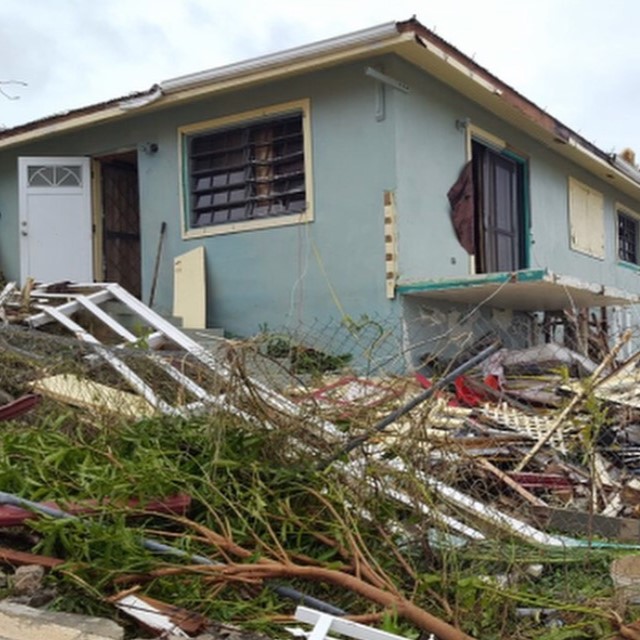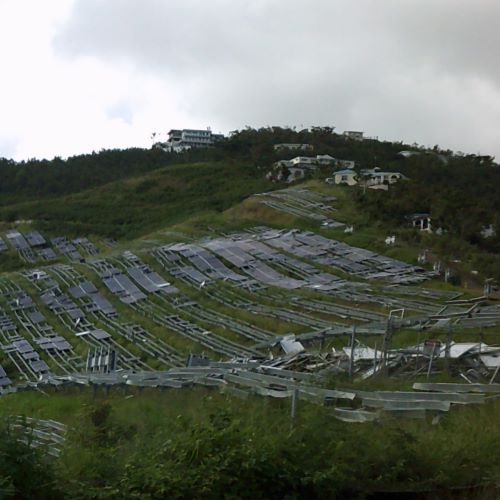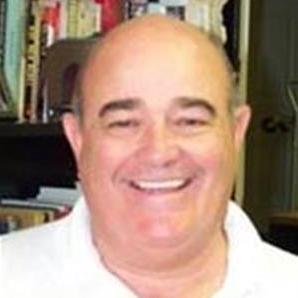
By Hans M. Louis-Charles, Benigno E. Aguirre, and Jamile M. Kitnurse
Hurricane Irma made landfall in the U.S. Virgin Islands (USVI) on September 6, 2017, followed by Hurricane Maria less than two weeks later. These two Category 5 hurricanes pummeled the islands, causing widespread damage to infrastructure, homes, and residents’ livelihoods.
Delayed assistance to the islands compounded the devastation, and restoration of electricity and essential health services took two to three months. Although the logistics of reaching the islands presented operational challenges to government relief, the Federal Emergency Management Agency (FEMA) later acknowledged its failure to respond equitably to the U.S. territories compared to their mainland responses in Texas and Florida.
Framing Disaster
 A home in Anna's Retreat, St. Thomas destroyed in a neighborhood surveyed by the authors. © Hans Louis-Charles, 2017
A home in Anna's Retreat, St. Thomas destroyed in a neighborhood surveyed by the authors. © Hans Louis-Charles, 2017
In the aftermath of the storms, U.S. news media inundated audiences with reports of pervasive looting and home burglaries. Online news publications used headlines describing scenes with phrases such as “hungry residents in survival mode” and “looters armed with machetes.”
Contrary to these media reports, social science research has shown that in most cases a pro-social environment develops, following disasters, during which community members engage in altruistic acts and collective coping methods. Field studies have shown that when looting does occur after a hurricane, it is often perpetrated by people looking for emergency survival needs. Yet, disaster criminologists have historically asserted that hurricanes and other disasters increase the likelihood of criminal activities in a community. Quantitative research has helped to shed light on more general patterns of crime in disaster.
To add to the existing body of evidence, this study examined the credibility of claims regarding looting and home burglaries in the USVI following Hurricanes Irma and Maria. In addition, we investigated whether perceptions of post-hurricane looting and burglary influenced household evacuation and sheltering behavior.
We conducted 68 qualitative interviews two months after Hurricane Maria made landfall in the USVI. Interviewees included 30 hurricane-impacted households, 20 business owners, 15 police officers, and 3 senior government officials. To supplement the interview data, we analyzed available secondary crime data from the Federal Bureau of Investigation (FBI) Uniform Crime Reporting Program (UCR) and the Virgin Islands Police Department (VIPD) on looting and burglary incidents during the time period 2010-2018. We used a rigorous ethical framework to inform our fieldwork in the USVI. Our work revealed the following patterns.
Looting and Burglaries vs. Strong Social Cohesion
One-third of the households we interviewed believed there was looting because it had occurred in the relatively distant past after Hurricanes Hugo in 1989 and Marilyn in 1995. However, none had personally experienced home burglary or knew of a neighbor who had experienced burglary or theft of any kind. In fact, many of the interviewees had at least one story to tell about neighbors helping them or assisting others after the hurricanes. According to one, “Even some of my anti-social neighbors became friendlier. It was neighbors helping neighbors.”
In addition, the police officers we interviewed did not know of any residential burglaries or business lootings. They also indicated that criminal activities may have been curtailed due to the curfew and the governor’s activation of the Virgin Islands National Guard.
Our review of available data from the FBI-UCR and VIPD showed a sharp decline in reported burglary incidents since 2010, but a four percent increase when compared to the year before the hurricanes. The increase spiked during the four months after the storms’ landfall and then was followed by a sharp decline in burglaries during months five to eight. Considering the delay in federal response immediately after the hurricane, we believe the momentary temporal increase in burglaries was likely related to survival appropriating acts, which decreased as humanitarian assistance began to arrive.
Businesses Secured and Protected
In St. Thomas, our interviews with business owners were focused in the area of Charlotte Amalie, a commercial area where luxury items are marketed to tourists. Although this is a high-risk area for theft-related crimes, interviewees revealed limited burglary concerns, and many attributed this to the strict curfew and the early presence of the National Guard.
In St. John, interviewees revealed no business looting in the main port area of Cruz Bay, although some stated that Coral Bay had experienced significant crime. However, a shop owner in Coral Bay said the burglary rumors were exaggerated and that “there were some kids misbehaving, but nothing serious occurred.”
False Alarms and Sheltering Behavior
Fear of home burglary as well as fear of crime in mass shelters can discourage people from evacuating or otherwise seeking potentially safe shelter outside the home in a hurricane. To examine whether the fear of intruders influenced decision-making, we included interview questions about how and why household members made the choice to shelter at home or evacuate.
Most of the people we spoke to (85 percent) sheltered at home or with friends or family and did not seek public shelter. When asked why they did not go to a shelter, 90 percent stated they did not think the storm would be severe, especially because so many “false alarms” had occurred during previous hurricane seasons. Others said they could not reach the shelters because of road conditions. None of the respondents said their reason for not evacuating was due to fear of looting or home burglary.
Focusing on Humanitarian Needs and Community Solidarity in the Wake of the Storm
 A solar farm destroyed by Hurricane Maria. © Hans Louis-Charles, 2017
A solar farm destroyed by Hurricane Maria. © Hans Louis-Charles, 2017
Contrary to the widespread reporting of mass looting and violent home burglaries, our interview data revealed a strong community solidarity in the immediate aftermath of the hurricanes. The discrepancy between our findings and the pervasive reporting of looting supports previous research asserting that disaster journalists are often encouraged to exaggerate and focus on sensational aspects of a disaster. They have the power to amplify certain aspects of an event to far-removed audiences, potentially reinforcing myths of post-disaster social disorder.
At the same time, other important aspects of a disaster may be downplayed, or even ignored. During the course of our interviews, and outside the scope of our questions, many respondents voluntarily raised concerns about food insecurity, housing inequity, infrastructure improvement, and underinsured homes in the islands. The resources allocated to curfew enforcement and property protection often eclipses funding for housing recovery and disregards the more immediate needs of residents, such as shelter, food, and medical care. Prioritizing the humanitarian needs of hurricane survivors not only addresses threats to residents’ health and livelihoods, it also helps mitigate the survival appropriation behavior that may account for some criminal activity in the absence of assistance.
About the Special Collection
This special collection of Research Counts grew out of a longstanding collaboration between the International Journal of Mass Emergencies and Disasters (IJMED) and the Natural Hazards Center. Our commitment in this special collection is to bring key findings and ideas from recent IJMED articles to a broader audience of emergency managers, disaster risk reduction professionals, and policy makers in the hazards and disaster field.
This Research Counts article was written by science and travel writer, Laurie J. Schmidt. It is based upon the following publication:
Louis-Charles, Hans M., Benigno E. Aguirre, and Jamile M. Kitnurse. 2021. “The Aftermath of IrMaria in the U.S. Virgin Islands: Temporal Patterns of Looting, Burglaries, and Community Solidarity.” International Journal of Mass Emergencies and Disasters 39(3): 319-345.


Hans Louis-Charles is an associate professor at The Wilder School of Government and Public Affairs at Virginia Commonwealth University. He teaches risk assessment, hazard mitigation, and disaster recovery courses within their Homeland Security and Emergency Preparedness program. His research focuses on emergency management, collective behavior in disaster, risk communication, social vulnerability, and disaster research ethics. Louis-Charles earned his PhD from the University of Delaware and is a former research assistant at the Disaster Research Center. He is a founding fellow and the current vice president of the William A. Anderson Fund for Hazard & Disaster Mitigation Education and Research.